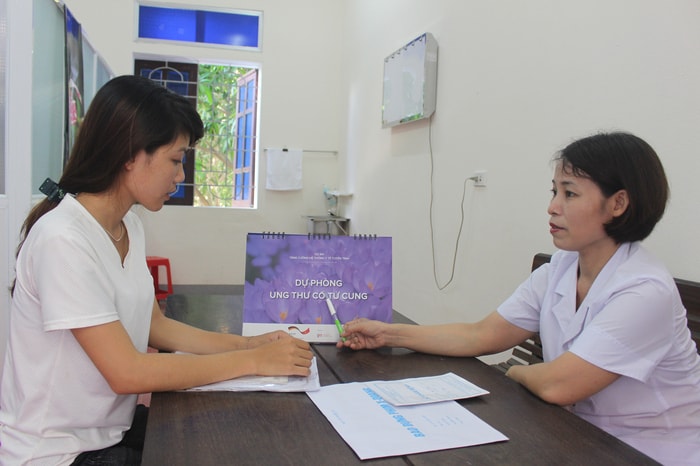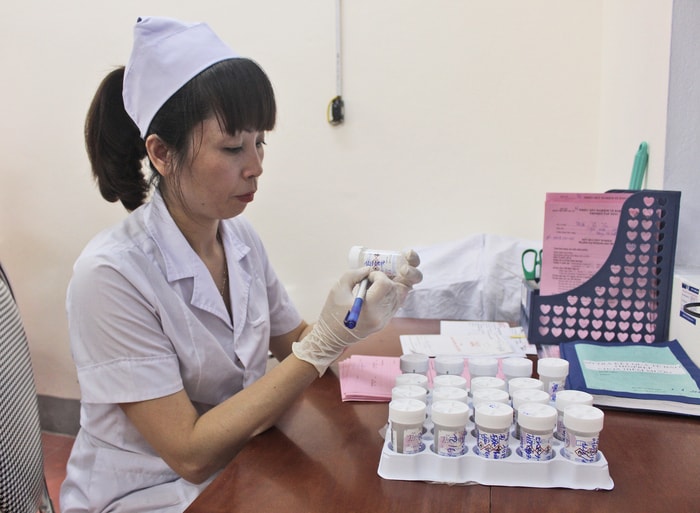Nghe An Center for Reproductive Health applies modern methods to screen for cervical cancer
(Baonghean) - Recently, Nghe An Center for Reproductive Health Care (CSSKSS) has implemented effective cervical cancer screening. Since 2016, the center has introduced the ThinPrep Pap Test into the screening and diagnosis process, aiming to improve the quality of screening and early detection of this dangerous disease.
Cervical cancer (CTC) is the fourth most common cancer and the second leading cause of death in women, after breast cancer. If detected early, the disease can be completely cured, but if the disease progresses to a late stage, the risk of death is high. HPV virus is the cause of more than 99% of CTC cancer cases. HPV virus is highly contagious and is mainly transmitted through sexual contact. CTC cancer often has no symptoms in the early stages. When symptoms appear, the cancer has usually developed and is at a stage that is difficult to treat.
 |
| A doctor advises women visiting the Provincial Center for Reproductive Health Care on how to prevent and screen for cervical cancer. Photo: Nguyet Minh |
Therefore, screening for early detection of cervical cancer helps to handle it promptly and increase treatment effectiveness. Previously, the Provincial Center for Reproductive Health Care implemented cervical cancer testing using the traditional method - Pap smear. In order to create conditions for people to access modern medical services in early screening for this dangerous disease, since 2016, the Center has implemented the ThinPrep Pap Test cervical cancer screening method. This method is considered a remarkable improvement compared to the conventional Pap smear test. If the previous Pap test only achieved a sensitivity of up to 70%, then with the ThinPrep Pap Test, the sensitivity in cervical cancer screening increased to 95%. Thinprep increases the specificity in detecting precancerous cells, especially glandular epithelial cells, a type of cancer cell that is very difficult to detect.
According to studies, the Thinprep method helps increase the number of high-risk cancer cell detections by 55% compared to the traditional Pap method. The Thinprep method also brings about a significant improvement in cell uniformity during sampling, helping to detect pre-invasive cell lesions in groups of patients coming to the hospital for examination, as well as screening results in the community.
When applying the Thinprep method, it will help significantly reduce the rate of false negative tests, especially increase the rate of detecting lesions of glandular epithelial cells, help diagnose accurately at early stages, bring high treatment efficiency, reduce treatment costs and reduce mortality rates. Screening for cervical cancer with this new method is done quite simply, like a normal gynecological examination. Patients are sampled for testing, preserved according to standards and the Provincial Center for Reproductive Health Care sends the test samples to Hanoi and are notified of the results after about 1 week. To achieve high efficiency in screening for cervical cancer, the Center has invested in a system of standard storage cabinets and proper preservation and transportation processes; at the same time, it has linked up with a reputable cell testing center in Hanoi to analyze the samples.
Ms. Nguyen Phuong Thuy (Quan Bau Ward, Vinh City) chose the Provincial Center for Reproductive Health Care to have regular gynecological examinations and cervical cancer screening once a year. She said, “Last year, I was advised by doctors at the center to have cervical cancer screening during a routine check-up and was found to have cell changes. I was prescribed, treated and enthusiastically advised by doctors on how to take care of my health, and the subsequent check-ups all had negative diagnosis results. Fortunately, I was detected early at risk of contracting this dangerous disease, so that I could receive timely treatment and protect my health.”
Previously, planning to have a baby but still not conceiving after nearly a year, Ms. Le Ngoc Minh (Vinh Tan ward, Vinh city) had an obstetrics and gynecology examination at the center and was found to have cervical ectropion. The center's doctors cured the disease, and she got pregnant and gave birth, and all of them were examined here. Ms. Minh said: "The center's doctors are not only highly qualified but also dedicated to their patients. They treated and advised me very appropriately, so I felt really secure and my condition quickly improved. Since then, I have had regular gynecological examinations and also had cervical cancer screening at the center; to prevent myself from getting sick."
 |
| Save the specimen to conduct cervical cancer screening test using the ThinPrep Pap Test method. Photo: Nguyet Minh |
The ThinPrep Pap test method has been included in the cervical cancer screening and diagnosis process by the Provincial Center for Reproductive Health for more than a year now, aiming to improve the quality of screening and detect the disease as early as possible. According to statistics, at the Gynecological Examination Department, on average, each month, 500 - 600 cases of cervical cancer screening are received using this new method. Among them, a number of cases with cell changes that need to be monitored have been detected, and there are cases with late-stage cancer. For example, in May 2017, out of 635 patients examined at the department, 19 cases were diagnosed with cell changes that need to be monitored.
However, cervical cancer is completely preventable if the lesions are detected and treated early, through regular screening programs. Dr. Hoang Thi Thu - Deputy Director of the Provincial Center for Reproductive Health Care recommends: Women need to be screened for cervical cancer once a year between the ages of 21 and 30. After the age of 30, ThinPrep Pap should be prescribed once every 1, 2, 3 years if the previous 3 tests are negative, once every 3 years if both HPV and ThinPrep Pap tests are negative. Although in recent years, the number of cervical cancer screenings has increased, the number of rural women who are aware of regular check-ups to detect this disease early is still limited. To evaluate some factors related to patients with abnormal results at risk of cervical cancer or cervical cancer of the Thinprep Pap test, to make recommendations and raise awareness for women in protecting their health. Currently, a group of doctors from the Provincial Center for Reproductive Health Care is conducting research on the topic: "Some comments on the results of patients with ThinPrep Pap test at the Nghe An Provincial Center for Reproductive Health Care from June to September 2017".
Along with that, the Center is oriented to invest in machinery to serve this technique, at the same time, strengthen the training of medical staff and doctors with specialized technical expertise; to improve the quality of examination and early detection of cervical cancer./.
Moonlight
| RELATED NEWS |
|---|

